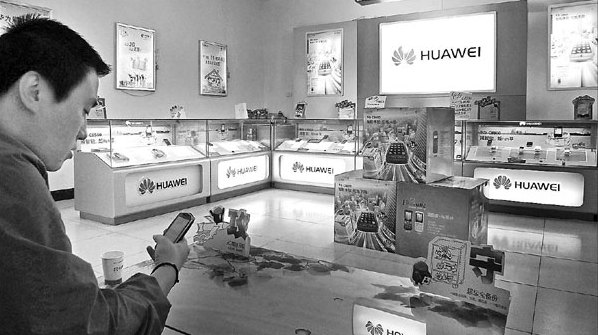War of words intensifies as Beijing rejects Washington claims of 'cyber attacks'
Updated: 2013-05-11 07:56
By Chen Weihua in Washington (China Daily)
|
|||||||||||
|
A customer buys a mobile phone at a Huawei store in Yichang, Hubei province. Ren Zhengfei, founder and CEO of Huawei Technologies Co, defended the Chinese company in the face of US cyber security claims on Thursday. Liu Fengjun / For China Daily |
The war of words over cyber attacks escalated this week with an official Chinese newspaper branding the US "the real hacking empire", two days after the Pentagon explicitly accused China of spying on the computer networks of US companies and government agencies.
The US Defense Department on Monday issued a report entitled 2013 Military and Security Developments Involving the People's Republic of China. Annual Pentagon reports on Chinese military development have been mandated by Congress since 2000.
On Wednesday, the People's Daily published a commentary which said the United States, by promoting the notion of a Chinese military threat, was trying to "sow discord" between China and neighboring countries in an effort to "contain China and profit from it".
"As we all know, the United States is the real 'hacking empire' and has an extensive espionage network," the newspaper said.
It accused the US of operating an extensive espionage network that targets both adversaries and allies, and it said the nation's intelligence gathering extends across political, military, scientific, technological and business fields.
The commentary described the large US investment in cyber-warfare capabilities and said the country has a 50,000-member "cyber army".
"To establish military hegemony on the Internet by repeatedly smearing other countries is a dangerous and wrong path to take and will ultimately end up in shooting themselves in the foot," the paper said.
In Beijing, a Foreign Ministry spokeswoman on Tuesday described the US defense report - issued the same day - as "irresponsible" and "groundless".
Also on Wednesday, the People's Liberation Army Daily ridiculed the Pentagon report as "sloppy work" that was based on "sheer speculation by netizens chatting on Chinese military websites".
It accused the US of "trumpeting China's military threat to promote its domestic interest groups and arms dealers", adding that it expects "US arms manufacturers are gearing up to start counting their money".
Washington has issued stern public rebukes over alleged Chinese cyber attacks since a report by the private Internet security-software provider Mandiant Corp was released in February. The company accused China's government of sponsoring a secret military unit in Shanghai that had repeatedly breached the networks of over 100 Western - mostly US - businesses, and stole data from them.
For the past two months, "Chinese cyber attack" has become a catch phrase for US media and think tanks.
China has insisted that it doesn't condone hacking and that it is the victim of hacking attacks, most of which it says emanate from the US. The Ministry of National Defense has released data that it says support this assertion.
After a trip to Beijing in April, US Secretary of State John Kerry said Washington and Beijing would form a working group on cyber security.
On Thursday, Ren Zhengfei, founder and CEO of Huawei Technologies Co, defended the Chinese company in the face of US cyber security claims.
"Huawei has no connection to the cyber security issue the US has encountered in the past, current and future," Ren was quoted as telling reporters in New Zealand.
The telecommunications networking gear that Huawei makes "is almost nonexistent in networks currently running in the US", he said. "We have never sold any key equipment to major US carriers, nor have we sold any equipment to any US government agency."
A report last October by two members of the US House of Representatives Intelligence Committee charged that Huawei and its competitor ZTE Corp posed a potential threat to US national security.
Much of the House committee's claims stem from the two companies' alleged links to China's army and government. Ren had already left the army by the time he founded the company in 1987.
Rick Falkvinge, a Swedish tech entrepreneur and politician, said Washington "needs to clean up its own act before trying to assert the moral high ground over the Chinese for their alleged hack attacks on the US".
In an opinion essay on Wednesday on the website of Russia Today, a Russian government-funded media outlet, Falkvinge, described the US accusations as "hypocritical and posturing".
He said the US-led Echelon program, a system to intercept communications, is used by the US not only for military purposes but also to give US industries "the upper hand in purely industrial applications, in competition with international counterparts".
Falkvinge said that so far only two countries are known to have used hacking militarily: the US and Israel, in what is believed to have been a joint attack on Iran's nuclear facilities.
Agencies contributed to this report.
chenweihua@chinadailyusa.com
(China Daily 05/11/2013 page10)
Today's Top News
Taiwan dispatches fleet to protect fishing boats
Deputy head of top economic planner probed
China, ASEAN to strengthen mining cooperation
Taiwan demands Filipino response
Moving overseas a remedy for nurses
Death toll rises in Sichuan coal mine explosion
Disclosure delays help fuel online rumors
Warming to Arctic exploration idea
Hot Topics
Lunar probe , China growth forecasts, Emission rules get tougher, China seen through 'colored lens', International board,
Editor's Picks

|

|

|

|

|

|






